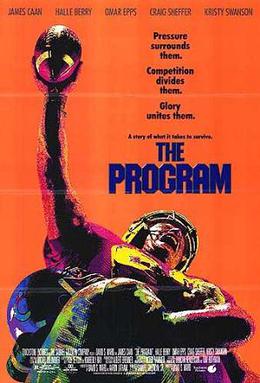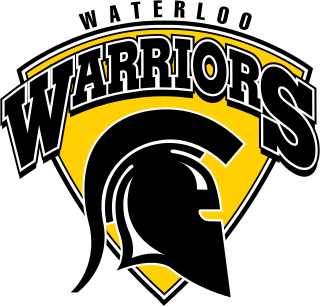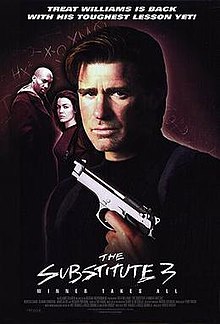Plot
Students at a local college have become unusually antagonistic, and when a teacher is attacked by a gang of steroid-pumped students, Karl Thomasson—having earned a teacher's degree to facilitate his actions in the previous film—returns to the classroom to uncover the truth.
What he finds is shocking: the college's football coach is involved in a steroid-doping scandal, and his 'juiced' students were responsible for the attack on the teacher. Thomasson recruits his old team, planting surveillance equipment in a jukebox inside a local sports-bar that hosts a number of the coach's football players.
It turns out that the coach was doping his players, and rigging football games, to pay off his backers—a local crime syndicate. When the audio equipment draws the attention of the syndicate's thugs, one of Karl's team is killed in the van, and Karl's calm and collected mask begins to slip.
When one of Thomasson's students dies from a steroid overdose, Thomasson finally loses his jovial nature, confronting the coach and telling him that he knows how the student died, that he knows the coach is responsible, and that he has videotape to prove his allegations.
In one last showdown, Karl defeats the syndicate and reveals the doping scandal—as he leaves, and the credits roll, a radio news report reveals that the football coach committed suicide in disgrace.
In competitive sports, doping is the use of banned athletic performance-enhancing drugs by athletic competitors as a way of cheating in sports. The term doping is widely used by organizations that regulate sporting competitions. The use of drugs to enhance performance is considered unethical, and therefore prohibited, by most international sports organizations, including the International Olympic Committee. Furthermore, athletes taking explicit measures to evade detection exacerbate the ethical violation with overt deception and cheating.
The Bay Area Laboratory Co-operative (BALCO) (1984–2003) was an American company led by founder and owner Victor Conte. In 2003, journalists Lance Williams and Mark Fainaru-Wada investigated the company's role in a drug sports scandal later referred to as the BALCO Affair. BALCO marketed tetrahydrogestrinone, a then-undetected, performance-enhancing steroid developed by chemist Patrick Arnold. Conte, BALCO vice president James Valente, weight trainer Greg Anderson and coach Remi Korchemny had supplied a number of high-profile sports stars from the United States and Europe with "the Clear" and human growth hormone for several years.

Cheating generally describes various actions designed to subvert rules in order to obtain unfair advantages. This includes acts of bribery, cronyism and nepotism in any situation where individuals are given preference using inappropriate criteria. The rules infringed may be explicit, or they may be from an unwritten code of conduct based on morality, ethics or custom, making the identification of cheating conduct a potentially subjective process. Cheating can refer specifically to infidelity. Someone who is known for cheating is referred to as a cheat in British English, and a cheater in American English. A person described as a "cheat" doesn't necessarily cheat all the time, but rather, relies on deceitful tactics to the point of acquiring a reputation for it.
Victor Conte Jr. is a former bassist with Tower of Power and the founder and president of Bay Area Laboratory Co-operative (BALCO), a sports nutrition center in California. He served time in prison in 2005 after pleading guilty to conspiracy to distribute steroids and money laundering. He currently operates Scientific Nutrition for Advanced Conditioning.
Kelli White is an American former sprinter. She won two gold medals in the World Championships in Paris in 2003. However, on June 18, 2004, she was stripped of her medals, because she tested positive on a drug test. She retired from professional track in 2006.

The Program is a 1993 American drama film starring James Caan, Halle Berry, Omar Epps, Craig Sheffer, Kristy Swanson, and Joey Lauren Adams. The film was directed by David S. Ward who has directed and written other Hollywood films such as the Major League series.
Rick Telander is the senior sports columnist for the Chicago Sun-Times. Hired in 1995 from Sports Illustrated, where he was a Senior Writer, Telander's presence at the newspaper was expected to counter the stable of sports columnists the rival Chicago Tribune had.
Doping in baseball has been an ongoing issue for Major League Baseball (MLB). After repeated use by some of the most successful professional baseball players in MLB history, these banned substances found their way to the collegiate level. At the junior college level, due to lack of funding and NCAA drug testing, the abuse of PEDs are most common but they are also an issue in Division I, II and III.
Trevor Graham is a Jamaican-born American former sprinter and athletics coach. Following the BALCO scandal, the US Olympic Committee barred him indefinitely from all its training sites.

Eufemiano Fuentes is a Spanish sports doctor who was implicated in the Operación Puerto doping case.

The Substitute 2: School's Out is a 1998 straight-to-DVD action-crime-thriller film directed by Steven Pearl and starring Treat Williams as Carl Thomasson, a mercenary who masquerades as a teacher in order to enter a tough urban school and wreak his revenge upon his brother's killer.
The BALCO scandal was a scandal involving the use of banned, performance-enhancing substances by professional athletes. The Bay Area Laboratory Co-operative (BALCO) was a San Francisco Bay Area business which supplied anabolic steroids to professional athletes. The incident surrounds a 2002 US federal government investigation of the laboratory.
In October 1988, Sports Illustrated published a lengthy article on alleged steroid abuse in the football program at the University of South Carolina. The article, titled "The Nightmare of Steroids" and written by University of South Carolina football player Tommy Chaikin in collaboration with Sports Illustrated's Rick Telander, alleged the widespread use of steroids in the football program at the school. Following the article, a federal grand jury indicted four University of South Carolina football coaches in connection with steroid distribution to players. Three of the coaches pleaded guilty in plea-bargain arrangements and the fourth was acquitted. The episode was listed among "some of college football's biggest scandals" by sports reporter Tom Weir of USA Today.
The use of anabolic steroids and performance-enhancing drugs in American football is officially prohibited by virtually every sanctioning body.
Since their discovery, anabolic steroids (AAS) have been widely used as performance-enhancing drugs to improve performance in sports, to improve one's physical appearance, as self-medication to recover from injury, and as an anti-aging aid. Use of anabolic steroids for purposes other than treating medical conditions is controversial and, in some cases, illegal. Major sports organizations have moved to ban the use of anabolic steroids. There is a wide range of health concerns for users. Legislation in many countries restricts and criminalizes AAS possession and trade.

The Substitute: Failure Is Not An Option is a 2001 action thriller film directed by Robert Radler and starring Treat Williams as Karl Thomasson, a former mercenary who must infiltrate a military school's faculty to stop the actions of a white supremacist cult. The film is the fourth and final installment in The Substitute series and was released direct-to-video.
In January 1985, Sports Illustrated published an article on steroid and other prescription drug abuse in athletic programs at Clemson University, South Carolina, which came to light following the death of a world-class track athlete at the school. The article, titled "A Pipeline Full of Drugs" and written by Sports Illustrated's Bill Brubaker, alleged the widespread use of illegally obtained prescription drugs, including steroids, in a number of programs at the university. Following the article, several Clemson coaches were indicted and pleaded guilty to charges of illegal prescription drug distribution, and the scandal ultimately led to the resignation of these coaches, the athletic director, the head of campus police, and the university's president.
Doping, or the use of restricted performance-enhancing drugs in the United States occurs in different sports, most notably in the sports of baseball, football, and as seen in the list of doping cases in cycling.

The Waterloo Warriors football team represents the University of Waterloo in the sport of Canadian football in U Sports. The Warriors U Sports football program has been in operation since 1957, winning two Yates Cup conference championships in 1997 and 1999. Currently, they are one of six teams to have never appeared in a Vanier Cup game and the longest tenured program in the OUA to have never qualified for the national championship game.






